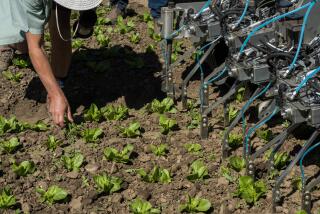Agriculture Urged to Win Confidence, Cut Chemicals
- Share via
DAVIS, Calif. — People in agribusiness must develop new methods to reduce dependence on chemicals if they hope to increase the public’s confidence in their products, a University of California researcher says.
“Agriculture is a disturbed system,” said William Liebhardt, director of sustainable agriculture at UC Davis.
“We manipulate; we change; we make it different. We have used a heavy-handed approach to solve problems.”
Liebhardt told engineers attending a recent Farm Machinery Conference at the campus that questions have been too narrow and need to be more broadly based.
“Things are going to be more information-intensive,” he said. “We will develop new products based on how things interact in the field.”
The challenge, he added, is “how to design a profitable farming system in an environmentally safe fashion and healthier for everybody.”
Liebhardt said some cultural practices lead to undesired results. He mentioned a Kern County cotton field that turned brown after being sprayed for insects.
Stimulates Insects
“The spray stimulated growth of mites because it knocked out beneficial (insects) that were keeping mites in control,” he explained. Use of pheromone sex stimulants to disrupt mating or change the behavior of the bad bugs might have worked better, he added.
Liebhardt also described several efforts under way in various parts of the state to edge away from heavy chemical use:
- The Harris Ranch in the western San Joaquin Valley “is trying to grow beef that is different--no growth regulators, hormones and no pesticide residues” from materials the animals eat.
“They are trying to produce a product that is much more acceptable to the market,” Liebhardt said. “They decided to produce a product that has certain kinds of qualities, a certain kind of thing people want.”
- Rice grower Ed Sills of Pleasant Grove has fields that are clean of weeds simply because he leaves the soil course instead of tilling it fine, which would encourage weed seeds to sprout. He also raises the water level on the rice paddy 2-4 inches above normal.
“He calls it ‘low-stress farming,’ ” Liebhardt said.
If heavy applications of expensive herbicides are used, the grower can’t afford to make a mistake because the cost cuts down the profit margin, but if chemical input is low, there is less expense and thus less stress, Liebhardt added.
- One peach grower hasn’t been bothered with brown rot on his crop since he quit using fungicides. Liebhardt admitted that scientists don’t know why.
- Research is being conducted in biological control of nematodes, parasitic worms in soil that damage roots.
“Whether it will work or not, we don’t know, but it is a different approach,” Liebhardt said.
Even though people in agribusiness need to adapt to such changes, conversion to a “total agriculture system” and away from primary use of pesticides to protect crops can be accomplished only gradually, he warned.
“If you take pesticides and materials we are using and simply pull them out of the system, farmers would flounder, so we need to develop new systems. We are going to have to find new ways of doing things,” Liebhardt concluded.






